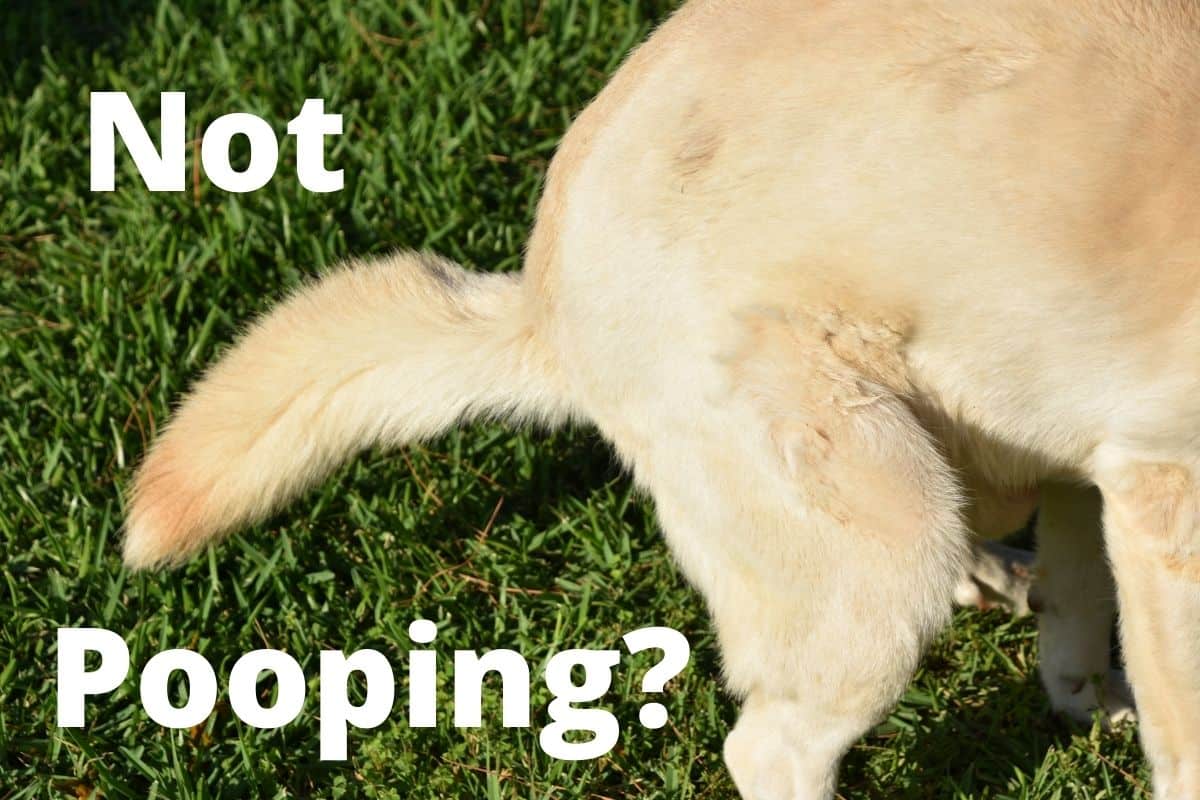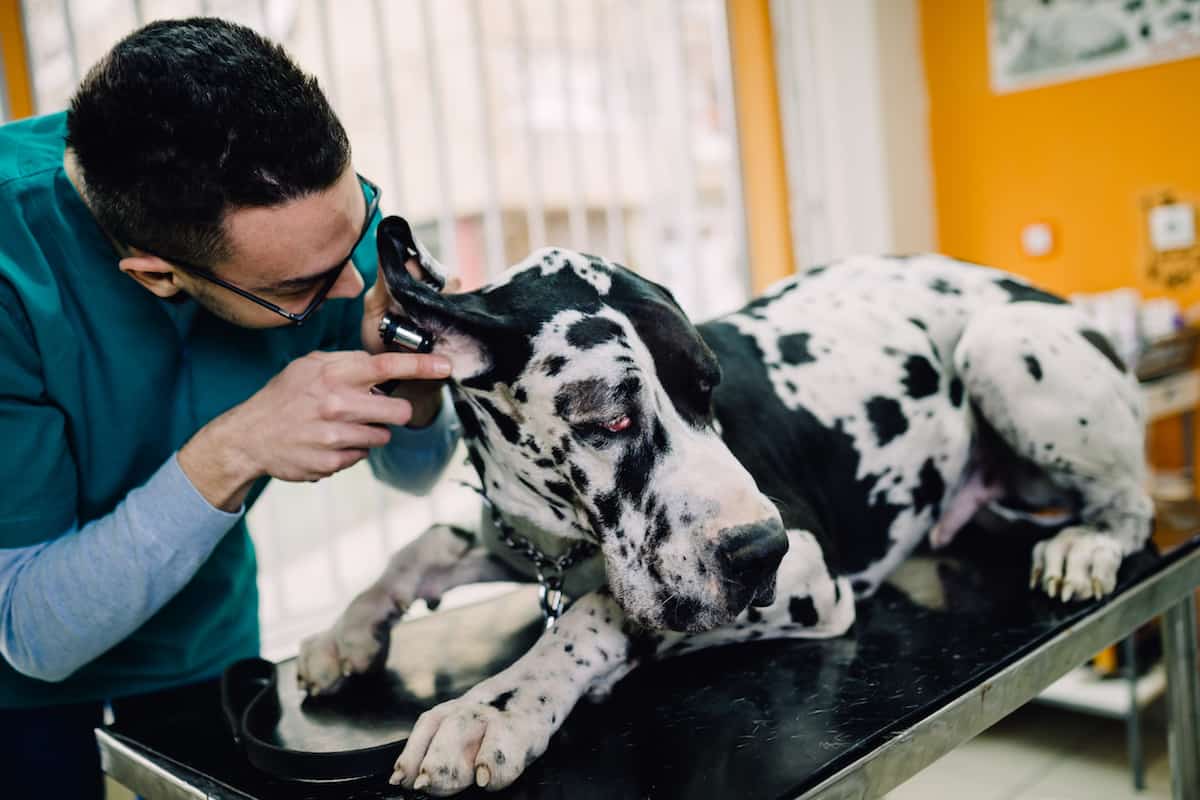
Is your dog not pooping? While you may be worried, dogs can go a few days without pooping and be just fine. There are also some reasons that your dog may not be pooping that you need to be aware of and know when you need to take them to the vet.
A healthy dog can go for 2 to 3 days without pooping without cause for concern. However, if your dog is vomiting, not eating, and seems lethargic, it is best to see your vet right away.
Monitoring your dog’s pooping behaviors may seem gross, it is a great way to be able to determine the overall health of your dog!
There are a few concerning health reasons that your dog may not be pooping, and you’ll want to know when you should take your dog to see the veterinarian.
Table of Contents
Why is my dog not pooping?
These are some of the few major reasons that your dog may not be pooping and what you need to do about each one.
#1 constipation
If your dog is constipated, it will not be pooping as often as they normally do.
Constipation can often be easily cleared up by sprinkling a small amount of MiraLAX on the food twice a day. This is an over-the-counter medication that you can find at most drug stores.
Also, increasing their fiber and water intake will help them from getting constipated.
If your dog does not have free access to fresh water, it can become dehydrated and eventually constipated.
#2 pain medications
Certain pain medications can cause your dog to become constipated.
Opioids such as Tramadol can lead to constipation.
If your dog is taking pain medications and is constipated, try decreasing their pain medications or ask your vet about switching to a different pain medication to help prevent your dog from becoming constipated.
#3 diarrhea
Many times, when you think that your dog is constipated, they actually have diarrhea.
Diarrhea causes your dog to have the feeling that they need to poop, but nothing comes out.
If your dog acts like they need to poop, but they do not poop, they may actually have diarrhea!
You will usually be able to tell if your dog has diarrhea after a few hours of following them outside to potty.
If your dog has diarrhea, offering them a bland diet and probiotics will many times clear up their loose stool.
#4 not eating
If your dog is not eating, they also will not be pooping.
Dogs who have been sick for a few days or that have not been eating as much will reach a point where they may not poop as much.
If nothing is going in, then nothing will be coming out. Usually, once your dog starts to feel better and eat better, it will start to poop regularly.
#5 They have an obstruction
Some dogs will eat anything and everything. This may even include your socks or underwear!
These things can get stuck along your dog’s gastrointestinal tract causing them to have an obstruction not allowing anything to pass and your dog not to be pooping.
At first, your dog may just not be pooping, but eventually, your dog will become sick and may be vomiting, not eating, or seem like their stomach is painful.
If you think your dog has an obstruction, it is best for them to see your vet immediately.
What can I do at home to help my dog poop?
If your dog is just not pooping regularly but otherwise acting normal, these are some things that you can do to help.
1. Increase water intake
If your dog is not drinking enough water, it can have a hard time pooping.
Make sure that your dog has plenty of fresh water available for them to drink at all times.
Some dogs even like fresh cold water, so make sure that their bowl is cleaned and refreshed often!
2. Increase fiber
Fiber can help stimulate your dog to poop. Giving your dog extra fiber in their diet will help make it easier for them to poop.
Giving your dog a small amount of pumpkin or even Metamucil fiber powder on their food each day will help make them able to poop easier and not get constipated.
3. over-the-counter medications
Some over-the-counter constipation medications for people can also be used for dogs.
MiraLAX can be given to dogs to help with constipation and make it easier for them to poop.
The dosage of this medication depends on the size of your dog.
- Small dogs: 1/4th teaspoon
- Medium dogs: ½ teaspoon
- Large dogs: 1 teaspoon
Before starting on any new medication, it is best to contact your vet to make sure that this medication is okay for them to take!

When do I need to see my vet?
If your dog has not pooped for more than three days and you have tried these at-home tips and tricks and your dog is not pooping, it is time to see your vet.
Many dogs who are constipated are also showing signs of illness. If your dog is vomiting, not eating, and seems lethargic, it is best to see your vet right away.
Things such as an obstruction can cause your dog not to poop.
What can my vet do for a dog who is not pooping?
If your dog is not pooping, your vet can examine it and run a test to determine what is wrong with your dog and why they are not pooping.
Things that your vet may do to determine why your dog is not pooping include:
- Fecal exam: your vet can pass a fecal loop to see if your dog has fecal material in their colon. They can also tell if this fecal material is hard and dry.
- Radiographs: Your vet may want to take an x-ray to see if a large amount of fecal material is present in their intestines. This x-ray can also see if there is an obstruction causing your dog not to poop.
If your vet thinks your dog is constipated, they can give it an enema. DO NOT attempt to give your dog an enema at home, as there are certain types of at-home enema that can be dangerous if given to dogs.
Normal Pooping Frequency in Dogs
A dog’s pooping frequency is heavily influenced by various factors such as age, size, breed, activity level, and diet.
In general, most adult dogs will poop once or twice a day, but some may go up to three times a day, while others may only go every other day.
It’s important to establish a regular and consistent bathroom habits for dogs to prevent constipation or diarrhea.
One way to do this is to set a feeding schedule and take them for a walk or allow them to go outside shortly after eating.
Most dogs will poop about 30 minutes after eating or immediately after waking up. These are both great times to plan walks or exercise for your dog.
However, it’s important to note that all dogs have different schedules, so learning what works best for your dog is essential.
If you notice that your dog is not pooping as often as usual, it could be a sign of constipation, which can be caused by various factors such as anxiety, lack of exercise, or dehydration.
A dog’s diet is also crucial to its pooping frequency and consistency. Feeding them a balanced and nutritious diet can help regulate their bowel movements.
For example, a diet high in fiber can help prevent constipation, while a diet low in fiber can lead to diarrhea.
Identifying Abnormal Poop
Dog poop can vary in color, texture, and odor depending on various factors such as diet, age, and overall health.
However, there are some signs to look out for that may indicate abnormal poop.
Color
The color of a dog’s poop can provide important clues about its health.
- Normal poop should be chocolate brown in color.
- If the poop is black or maroon, it could indicate stomach or small intestine bleeding.
- If the poop is red, it could indicate bleeding in the colon or rectum.
- On the other hand, if the poop is gray or yellow, it could indicate a problem with the liver or pancreas.
Blood
Blood in a dog’s poop is never normal and should be taken seriously.
If there is fresh blood in the poop, it could indicate an injury or inflammation in the lower digestive tract.
If the blood is dark and tarry, it could indicate bleeding in the upper digestive tract.
Diarrhea
Diarrhea is a common problem in dogs and can be caused by a variety of factors such as diet, stress, or infection.
If the diarrhea is mild and goes away on its own within a day or two, it is usually not a cause for concern.
However, if the diarrhea is severe, lasts for more than a few days, or is accompanied by other symptoms such as vomiting or lethargy, it could indicate a more serious problem.
Stool Softeners
Stool softeners are medications that are used to treat constipation in dogs. While they can be effective in relieving constipation, they can also cause diarrhea and other digestive problems if not used properly.
It is important to follow the veterinarian’s instructions when giving a dog a stool softener and monitor their poop for any signs of abnormality.
Dog Poop FAQs
HOW LONG CAN A DOG GO WITHOUT POOPING?
Dogs can go without pooping for up to 2 days, but it is not recommended to wait that long. A healthy dog should poop at least once a day. If a dog has not pooped in 48-72 hours, it can be a sign of constipation or a blockage, and a vet should be consulted.
CAN A DOG DIE FROM NOT POOPING?
Yes, a dog can die from not pooping. If a dog cannot poop for an extended period, it can lead to a serious condition called obstipation, which can be fatal if left untreated. This condition causes the colon to become distended, leading to rupture, septicemia, and death.
WHAT SHOULD I DO IF MY DOG HASN’T POOPED IN 3 DAYS?
If a dog has not pooped in 3 days, it is important to take them to the vet immediately. The vet will examine the dog and may perform tests to determine the underlying cause of the constipation or blockage. Treatment may include medication, enemas, or surgery, depending on the severity of the condition.
HOW DO YOU TELL IF MY DOG IS CONSTIPATED OR HAS A BLOCKAGE?
Signs of constipation in dogs include straining to poop, dry and hard stools, and decreased appetite. Signs of a blockage include vomiting, diarrhea, abdominal pain, and lack of appetite. If a dog is showing any of these symptoms, it is important to take them to the vet immediately.
HOW CAN I HELP MY DOG POOP?
Several ways to help a dog poop include increasing their fiber intake, adding canned pumpkin or sweet potato to their food, and providing plenty of fresh water. Exercise can also help stimulate bowel movements. If the dog is severely constipated, the vet may prescribe medication or perform an enema.
WHY HASN’T MY DOG POOPED IN A LONG TIME?
There are several reasons why a dog may not be pooping, including constipation, blockage, stress, dehydration, and certain medications. It is important to take the dog to the vet if they have not pooped in an extended period of time to determine the underlying cause and provide appropriate treatment.
Final Thoughts On Not Pooping
There are many reasons that your dog may not be pooping. While most dogs can go a few days without pooping, it would be best to see your vet if your dog is not pooping for more than three days.
As soon as you start to notice that your dog is not pooping, you can try some of these at-home tips and tricks to see if your dog will start pooping again.
If not, it would be best that your vet examines your dog and figure out what is going on and why they are not pooping.
